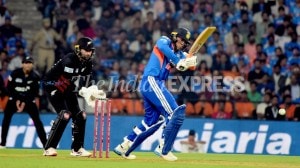What me retire?
In Mumbai, as they cheered the passing of the baton in their 25th anniversary celebrations, did the BJP8217;s rank and file even realise th...

In Mumbai, as they cheered the passing of the baton in their 25th anniversary celebrations, did the BJP8217;s rank and file even realise this anomaly? With L.K. Advani shepherding Rajnath Singh into the party president8217;s chair, the process awkwardly kickstarted by RSS chief K. Sudarshan in the spring of 2005 was finally completed. Now, look towards Nagpur, and the old order remains. Sudarshan may have thundered the case for a younger leadership in the BJP in his famous television interview. But he himself, not so many years short of Advani8217;s 78, continues to preside over his pracharaks. Clearly, those ripe for retirement homes can afford to issue advice recommending generational change without the fear of it ricocheting back.
And why not? In a culture that has traditionally bragged about smooth passage through life8217;s many phases to clean sanyas, practice no longer matches scripture. Take the CPM. Prakash Karat may have finally ascended to the glory marked out for him for so many years. But, as he took over as party general secretary from a ninetysomething Harkishen Singh Surjeet, he did so at the brink of a boyish looking 60 8212; an age that in any other walk of life would have brought long meetings with the accountant on how to manage one8217;s retirement nest. Any wonder then that our elected representatives appear so loath to debate pension reform. Pension comes with retirement. They, youthfully pushing up the average age in Parliament, what do they know about such far-off spectres.
As in politics, so in that other Indian obsession, cricket. Spare a compassionate thought for Mohammed Kaif, sportingly agreeable to being called a young hopeful for the Test side at 25, three years after he laid conclusive claim to being included in the playing eleven. How can he get his rightful chance, that too on merit, when Sourav Ganguly refuses to Go. What to do? Dada is Indian, he is like us only, forever young.
- 01
- 02
- 03
- 04
- 05































